Welcome to Christogenea.
Why did ancient Egypt, once the greatest of all nations, crumble into oblivion, where it has remained for 3,000 years? What happened to the glory of ancient Babylonia, or to Assyria? Where is the splendour of the ancient Persians, or the Medes, or Parthia? How have the Greeks, the pinnacle of ancient civilization, not produced anything of note as a culture since the fall of Byzantium nearly 600 years ago? What happened to the might and the majesty that was Rome, once far greater than them all? How, or why, have all of these once magnificent cultures for so long been little more than quarries for museum relics? America, and all of Christian Civilization, is now following in the footsteps of these ancient empires. It's absolutely true. The evidence is all around you. History does indeed repeat itself, again and again because people refuse to learn from it. But there is a solution.
You can deny it. You can rant and rave. You can scream. You can cry "hate" and utter blasphemies. You can make railing accusations. But you can't change the truth. A shining city on a hill cannot be hid. A lamp when lit is not placed under a couch. There is indeed a God of all creation. And there is indeed a race anointed by that God. Here it is identified. Whenever that race allows itself to amalgamate with others, it falls into permanent decay. Understanding this is one of the keys to all history, and it is the understanding of the rise and fall of all great cultures. You can go away mad, even spouting profanities, or you can face the reality, and consider the implications while investigating the assertions being made. For more information, START HERE.
Search form
New! Support Christogenea via GiveSendGo! Christogenea is 100% reader supported. If you find value in our work, please contribute and help to keep it going! See our Contact Page for more information!
European Fellowship Forum, December 2025

Thanks to all who participated! A partial description of the subjects discussed:
The fallen angels, the Michael of Scripture, National Socialism and Hitler, Christian obligations and responsibilities. The Soviet threat, Hitler’s predicament and failures. The traitors in National Socialist Germany. Here Harald, who was born and raised in East Germany, helped fill in a lot of facts which contribute to an understanding of the failure of NS Germany. Folly of NS Germany pact with Japan.
Participation in the usury based economy vs. need for survival, the difference between participating and profiting vs. suffering and tolerating the usury economy. Jewish/corporate objectives to force all of the West into a Chinese-style form of corporate communism. Contributions of technical advancement and party politics contributions to that endeavor. AIPAC money and near-total congressional control. The assassinations of AfD politicians, brainwashing of society in Germany, Police are zogbots.
Society, the role of women , in the spreading of truth, as examples for the moral guidance of society and in the raising of families. Thoughts are prayers, Yahweh knows all the thoughts of one’s heart, so they cannot be distinguished. Sheep and goats, judgment and motivation.
The value of modern education. Decadence in colleges and military. Impact and causes of inflation since the 1940’s. Presence of women in police, the military and the general workplace beginning with the glorification of women in the workplace in the wartime 1940’s.
Leadership and organization in a Christian community, what the apostles truly left as opposed to the Word of God and the warnings in the Parable of the Trees of the Forest.
Sven Longshanks and some of his recent experiences following his travail with the British government, as well as some of his experiences with British prison.
Some of the theories of L.A. Waddell, author of early 20th century books such as The Phoenician Origin of Britons Scots and Anglo-Saxons and The British Edda: A Journey Through Time. The Eddas, the Aesir and Vanir and my theory on their identity. Sarmatians, Slavs, Scythians and Germanic tribes in relation to the promises of Abraham and Noah’s words in Genesis chapter 9.
Immanuel Velikovsky, Zechariah Sitchin and some of their theories. Barry Fell and America BC. Early exploration of North America by Vikings, Danes, and even Celts.
The need for repentance from seeking earthly kings.
And more!
A Commentary on Isaiah, Part 53: The Redeemed of Yahweh
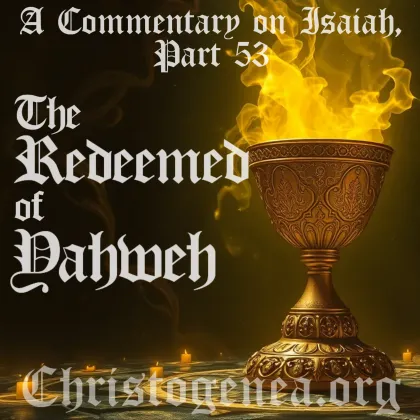
A Commentary on Isaiah, Part 53: The Redeemed of Yahweh
In Isaiah chapter 41 the Word of Yahweh turned from the events surrounding Judah and Jerusalem, and began to address the isles and coastlands, which are the places where the children of Israel would be found after the time of the Assyrian captivities. Many had also escaped Palestine by sea, and others had settled the Mediterranean coasts much sooner, which we had discussed in relation to The Burden of Tyre much earlier in Isaiah’s writing, where Yahweh had also admonished them, that they would not be forgotten. However, from that chapter forward, the context in the narrative of Isaiah really has no clear break until the opening verse of chapter 49, where the Word of Yahweh once again begins to addresses the same people and says “Listen, O isles, unto me; and hearken, ye people, from far,” so even that is not really a break in the context at all but seems to be more of a reminder of who it is that He is addressing. Then, while He had addressed the isles and coastlands, at the same time Yahweh continually addressed Jacob and Israel, so they remain His subject and concern throughout Isaiah, and it cannot be imagined that He is speaking to any people other than Israel in captivity. None of the promises found throughout these chapters of Isaiah are relevant to any other people. The isles or coastlands who would await His law and His light are the places where He had expected to find the children of Israel.
This is illustrated even further where chapter 50 opens, and the children of Israel in captivity are challenged to produce their mother’s bill of divorcement, their mother being an allegory for their nation, and again here in chapter 51 where in the opening verses they are told to look to their ancestors, Abraham and Sarah. So nearly eight hundred years after the time of Isaiah, when Paul of Tarsus had written his epistle to the Romans, he explained in Romans chapter 4 that the promise the Abraham’s seed had already become many nations by his time was fulfilled “as it is written”, and he told his readers that Abraham was their forefather, according to the older Greek manuscripts, or their father, in the medieval Byzantine manuscripts, “as pertaining to the flesh”, so Abraham was their natural, genetic forefather, as well as the forefather of the remnant of Judah in Judaea. The Israelites of the captivity who had forsaken the law, for which reason they were sent into captivity, had become the “uncircumcision” of Paul’s epistles, while the Israelites of Judaea who had aspired to keep the law were the “circumcision” of his epistles.
Topical Discussions, December, 2025

Topical Discussions, December, 2025
Here I am going to take another break from our Isaiah commentary and instead endeavor to treat a few subjects which arise continually, and although I have treated them in the past, in places such as the Christogenea Forum or from various perspectives in diverse commentaries, most of those are not as complete a treatment as I may be able to do here. However for some of these subjects, which are the pagan nature of Christmas and the inaccurate dating of the birth of Christ by the churches, it is also a discussion which is seasonable. We shall also discuss our reasoning for our interpretation of the Biblical Hebrew calendar. But first I want to address something which is taken for granted because it is repeated very often in social media, and even in print media and books.
Here we shall discuss three subjects, or actually four: By Way of Deception Christians Should Not Interpret Scripture, Reckoning the Dates for the Passover and the Day of the Sabbaths, How Christmas is Pagan and Dating the Birth of Christ. Our presentation of the last two subjects is hopelessly intertwined.
By Way of Deception Christians Should Not Interpret Scripture
That is the motto of the subversive jewish agency known as the Mossad, which is typically said to read "By way of deception you shall wage war", and it seems that most people take for granted the jewish claim that this motto is a citation from Proverbs 24:6. So first, we shall cite Proverbs chapter 24:
1 Be not thou envious against evil men, neither desire to be with them. 2 For their heart studieth destruction, and their lips talk of mischief. 3 Through wisdom is an house builded; and by understanding it is established: 4 And by knowledge shall the chambers be filled with all precious and pleasant riches. 5 A wise man is strong; yea, a man of knowledge increaseth strength. 6 For by wise counsel thou shalt make thy war: and in multitude of counsellors there is safety. 7 Wisdom is too high for a fool: he openeth not his mouth in the gate. 8 He that deviseth to do evil shall be called a mischievous person. 9 The thought of foolishness is sin: and the scorner is an abomination to men. 10 If thou faint in the day of adversity, thy strength is small. 11 If thou forbear to deliver them that are drawn unto death, and those that are ready to be slain; 12 If thou sayest, Behold, we knew it not; doth not he that pondereth the heart consider it? and he that keepeth thy soul, doth not he know it? and shall not he render to every man according to his works?
A Commentary on Isaiah, Part 52: The Comfort of Zion
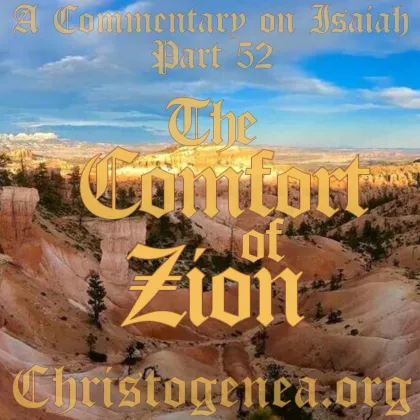
A Commentary on Isaiah, Part 52: The Comfort of Zion
While discussing Your Mother’s Divorcement, where we had taken a phrase that is found in the opening verse of Isaiah chapter 50 for the title of our discussion of the chapter, we had seen that even in their state of bereavement, having been put away by Yahweh their God, who had been the Husband of their nation, the children of Israel had nevertheless been given hopes of redemption and deliverance. Then, for most of the balance of that chapter, there is a description which, in hindsight, is clearly a Messianic prophecy describing a man who would suffer shame and reproach, but who would ultimately overcome his enemies by the power of God. In the final verses of the chapter, those who fear Yahweh and obey His servant, the promised Messiah, would have hope, but those who were self-reliant and would attempt to walk in their own light, rather than await the light of God, would die in sorrow.
In the course of our discussion of that chapter, we hope to have illustrated the fact that the allegory of the marriage relationship between Yahweh God and the children of Israel as a nation is really much more than an allegory: it is a fact of history which transcends history itself. It is certain in many ways in Scripture, that Yahweh God does not care for the standards set by men. According to His Word, He is both the Husband and the King of the children of Israel, and that arrangement began in the wedding vows taken at Sinai which are described in the Book of Exodus.
A Commentary on Isaiah, Part 51: Your Mother’s Divorcement

A Commentary on Isaiah, Part 51: Your Mother’s Divorcement
In our last discussion of Isaiah and the final portion of Isaiah chapter 49, we hope to have demonstrated how the children of Israel had moved to A Place of Their Own, as the prophet Nathan had much earlier communicated to king David, in 2 Samuel chapter 7, and as Isaiah had prophesied in that chapter, where he also indicated that in captivity, the children of Israel would multiply greatly, and their enemies would shrink from them, in verse 19 where we read: “19 For thy waste and thy desolate places, and the land of thy destruction, shall even now be too narrow by reason of the inhabitants, and they that swallowed thee up shall be far away.” Then he indicated that they would seek to migrate to a different location, where we then read: “20 The children which thou shalt have, after thou hast lost the other, shall say again in thine ears, The place is too strait for me: give place to me that I may dwell.” The subsequent verses then describe Israel as “desolate, a captive, and removing to and fro”, which is also indicative of their becoming a migratory people and leaving the places of their captivity and making a new home in another land.
In recent portions of this Commentary, we have already cited Isaiah chapter 66 in reference to this outcome, where we read in reference to these same people: “19 And I will set a sign among them, and I will send those that escape of them unto the nations, to Tarshish, Pul, and Lud, that draw the bow, to Tubal, and Javan, to the isles afar off, that have not heard my fame, neither have seen my glory; and they shall declare my glory among the [Nations].” As we had said, all of these places are located in the north and west, from the coasts of the Black Sea to Anatolia and then west to modern Italy and Iberia. Historically, beginning about a hundred years after the time of Isaiah, from the fall of Assyria the people known as Khumri or Kimmerians did migrate in that direction, and they were followed by their kindred for several centuries, who were also known by the names Sakae, Scythian and Galatae, but later as Saxons, Goths, Alans or or by numerous other and later names.
Challenging Orthodoxy: Further Scriptural Witnesses Against the Trinity Doctrine
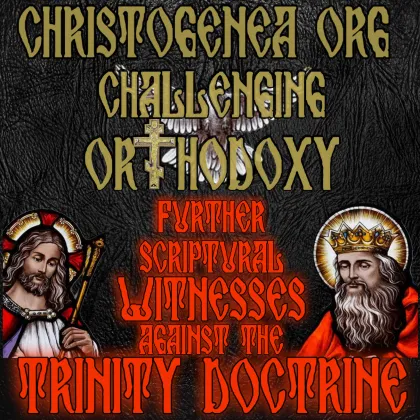
Challenging Orthodoxy: Further Scriptural Witnesses Against the Trinity Doctrine
Ever since I began the commentary on the Gospel of John back in 2018, which was an endeavor that took me nearly two full years to complete, I have wanted to do certain topical programs which condensed particular subjects that are prominent in the Gospel of John into single topical presentations. In my estimation, the Gospel of John was the last one written, and was purposely written in a way which sets it apart from the synoptic Gospels. The apostle John illustrated teachings both about Christ and from Christ which the synoptic Gospels only represent superficially, or had excluded entirely. So I view John as a retrospective account of the Gospel, as John seems to have read the others, and chose to fill in many of the gaps from the substance and ministry of Christ which were left unrecorded in the synoptic gospels. One of those subjects is the nature of Christ Himself, so that John provides much of the evidence against the later so-called trinity doctrine of the Roman Catholic Church. But for some time I procrastinated, having been busy with other projects, so it has been seven years, at least, since I first realized a need to do this, and when I finally began to prepare for this discussion, I honestly thought it would only be a single presentation. However doing that first presentation, I had to stop at about eleven thousand words, because I ran out of writing time, and that left several thousand words of notes for Scriptures that were left without mention. Therefore, here we are with a second discussion challenging the trinity doctrine, and I shall try not to repeat much of what I had said in the first discussion.
But when I finally resolved to discuss this subject of the so-called trinity here three weeks ago, it had been precipitated by a certain presumed friend who has continually accosted me, attempting to correct me for what he perceives to be my shortcomings. While we have been acquainted in social media for many years, he even joined the Christogenea Chat back in August, just to argue with me about his trinity doctrine, which he holds precious, and now he has once again badgered me in social media. But he also continually and rather consistently misrepresents me and my positions on the issue, probably because he has not actually read my papers. However, certain people seem to have a difficult time reading and grasping things which they find disagreeable, and now after several long back-and-forth discussions with this individual, I am convinced that he is one of them. He claims to admire my work, but he really only admires it to the point where he agrees, and then he thinks he has some divine commission to demand that I change where he does not agree. While I continue to disagree, in essence, his attitude is that he knows everything, and he can correct me because I don’t know what I am talking about. It is actually arrogant for such a man to keep confronting me when I refuse his correction.
Documenting Jewish Cooperation with Muslims During the Islamic Conquests of Europe and the Near and Middle East
This article offers an excerpt from the book: The Jews of the Ottoman Empire and the Turkish Republic by Stanford J. Shaw. This book was published by New York University Press in 1991, and it is now evidently out of print. It must be noted, that Wikipedia acknowledges that Shaw himself has Jewish heritage, although he was born and raised in St. Paul Minnesota.
Challenging Orthodoxy: Scriptural Witnesses Against the Trinity Doctrine
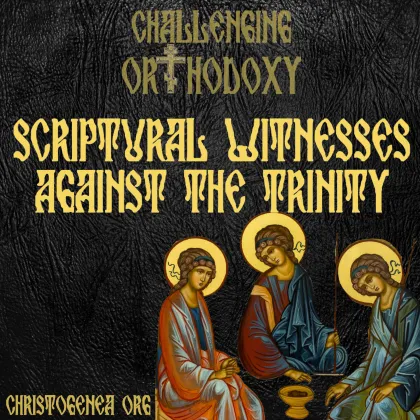
Challenging Orthodoxy: Scriptural Witnesses Against the Trinity Doctrine
Before I begin, I must repeat something I have stated very frequently over the past few decades, which is that no part of Scripture is a lie. One verse of Scripture does not disprove another verse. If there is a perceived conflict, sometimes it is a corrupt text, which, on occasion, can be rectified by examining ancient manuscripts. Sometimes it is merely a poor translation which is more easily corrected upon examining the original languages. Sometimes it is a poor understanding of the context in which . But much more frequently than any of these, is a poor understanding on the part of the reader, and a lack of knowledge which is rectified only through further study. Therefore all of the “gotcha” verses which a scoffer may pull out of his pocket to refute our claims here this evening, do not prove what the scoffers think they prove.
Yes, Christ, the man, often prayed to God the Father, and often spoke of God the Father, from the perspective of a man. But that which He had done, He did as an example to men. When He washed the feet of His disciples, He said, as it is recorded in John chapter 13: “15 For I have given you an example, that ye should do as I have done to you.” Then, in 1 Peter chapter 1 we read: “21 For even hereunto were ye called: because Christ also suffered for us, leaving us an example, that ye should follow his steps: 22 Who did no sin, neither was guile found in his mouth: 23 Who, when he was reviled, reviled not again; when he suffered, he threatened not; but committed himself to him that judgeth righteously”, so that likewise, we would strive to live as He had lived, without sin and committing ourselves to His judgment. For that reason, to serve as an example for men, during His earthly ministry He behaved just as a man should behave, and not as God. After His resurrection, he was recognized as God. Yahshua Christ did not become a god, but rather, He is God who became a man, and His Resurrection proved that He is God. When the apostle Thomas had realized that it was Christ who was resurrected from the dead, he responded by declaring “My Lord and my God!” The prophet Isaiah was read in the synagogues, Christ Himself read from Isaiah and declared one Messianic prophecy to have been fulfilled in Himself, so men knew the other prophecies concerning their promised Redeemer, and they understood that those prophecies were fulfilled in Christ.
Jesus Christ is God - The Megiddo Mosaic
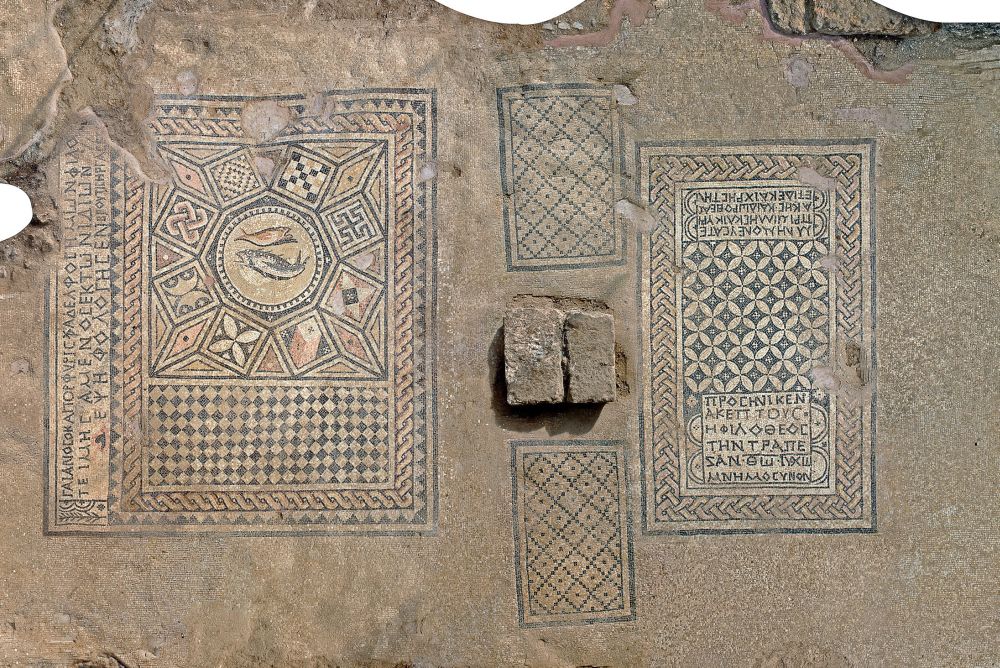
The Megiddo Mosaic was discovered under the floor of an Israeli prison in Megiddo, in 2005.
New Version July 5th! A Handbook Against Heresies for Identity Christians
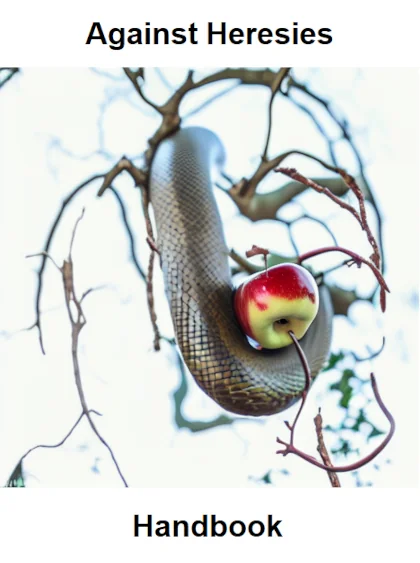 A friend has created a Christian Identity: Handbook Against Heresies which seeks to compile and explain from Scripture a collection of basic Christian concepts which is meant to be a quick witness to help address and combat basic heresies and misunderstandings. This may also serve as a good primer for those wanting an overview of our general Christian Identity professions.
A friend has created a Christian Identity: Handbook Against Heresies which seeks to compile and explain from Scripture a collection of basic Christian concepts which is meant to be a quick witness to help address and combat basic heresies and misunderstandings. This may also serve as a good primer for those wanting an overview of our general Christian Identity professions.
The Handbook was updated and a new copy posted July 5th, 2024. We expect this to happen periodically.
Download the PDF handbook here. There is also a clean version formatted for printing without any underlined cross-references and no highlighting. Another version without highlighting removes all background color from the text, but it has underlined cross-references. here you may also download the clean version, the version without highlighting, or now for a combined version which contains both highlighted and clean copies of the text.
Help Support Christogenea
 These past few years, and the past few months especially, Christogenea has been cut off from most of its sources of funding. CashApp has cancelled us. We are currently searching for another new credit card processor as we have already been cancelled by cornerstone.cc, who has been rejecting payments for the past week. Cornerstone has not given us any explanation although we have requested one. We know the explanation already.
These past few years, and the past few months especially, Christogenea has been cut off from most of its sources of funding. CashApp has cancelled us. We are currently searching for another new credit card processor as we have already been cancelled by cornerstone.cc, who has been rejecting payments for the past week. Cornerstone has not given us any explanation although we have requested one. We know the explanation already.
If you appreciate our work, please remember that it is not "free" to produce or to keep freely available. Please help support Christogenea and keep us working!
Aside from 15 separate websites, a chat and 6 radio streams, Christogenea freely hosts over two dozen unrelated Christian Identity or Christian Nationalist websites, and incurs online expenses of over $1200 each month, not including the funding we need to produce our studies and other content
The Scorpion and the Frog, from Aesop's Fables
A scorpion and a frog meet on the bank of a stream and the scorpion asks the frog to carry him across on its back. The frog asks, "How do I know you won't sting me?" The scorpion says, "Because if I do, I will die too."
The frog is satisfied, and they set out, but in midstream, the scorpion stings the frog. The frog feels the onset of paralysis and starts to sink, knowing they both will drown, but has just enough time to gasp "Why?"
Replies the scorpion: "Its my nature..."
Never expect anyone to act contrary to their nature.

Addendum: The Wisdom of Solomon - An English Translation by William Finck
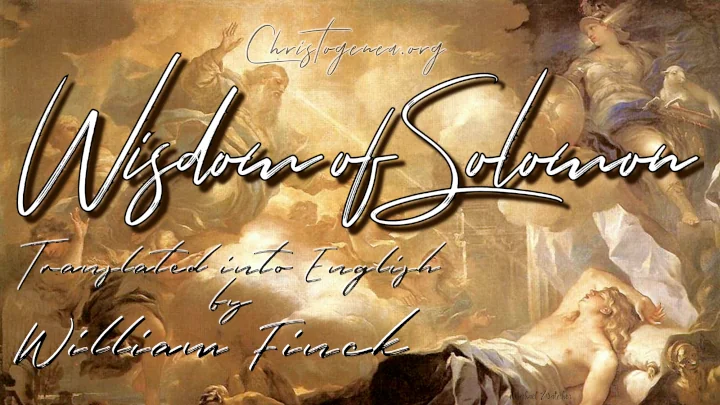
A completely new translation by William Finck of Christogenea.org, based on the text of the Rahlfs-Hanhart Septuaginta, but not necessarily following the punctuation of that edition. Download the PDF here. There is also a navigable chapter-by-chapter Greek-English Interlinear Version.
The Wisdom of Solomon is a profound and inspired work of literature, which, with all certainty, should have been included in the canonical Scriptures alongside the other works of Solomon, regardless of the fact that there is no extant Hebrew manuscript. The work is found in early lists of church canon, such as the Muratorian Canon, and it was included alongside the other Biblical books of wisdom in the Old Testament in the 4th century Codices Sinaiticus (א) and Vaticanus (B) and in the 5th century Codex Alexandrinus (A). While there have been contrary claims, for example at the Israeli website deadseascrolls.org, no supporting evidence has been presented, and therefore the work has evidently not been found among the Dead Sea Scrolls. However we must wonder if those examining the Scrolls would even recognize it, since there is no known Hebrew text against which to reference any possible fragments.
Passages from the Wisdom of Solomon were alluded to by Paul of Tarsus, and had obviously been an influence on him in his writings. For example, the “whole armor of God” analogy is very close to a description of the wrath of God found here in Wisdom chapter 5. In Romans chapter 8, Paul had used the term for creation in the same fashion as it was described in Wisdom chapter 19, in verse 6. Yet Wisdom also presages many of the illustrations which Yahshua Christ had employed in various of His parables in the Gospel, especially where Solomon spoke of races of men and their generations as trees and branches.
Of course, while we cannot imagine that Christ was inspired by Wisdom, His use of so many similar allegories in the same contexts certainly elucidates the fact that Solomon was inspired by Him. So in Wisdom we find rebukes of the lawless, the godless concept that “might is right”, the wandering of the impious into the corruption of their seed through miscegenation, and the fact that bad trees cannot produce good fruit, along with an exposition of some of the beginnings of idolatry. Finally, there is an analogy portraying the world of the wicked and of sin as Egypt and Sodom, much like the Revelation also attests, and the reordering of the creation of God in the organization of the children of Israel, which is how the history of the children of Israel had begun, and how Revelation also concludes. The Wisdom of Solomon is indeed a masterpiece of Christian theology, and a philosophical bridge between the Old and New Testaments which no true Christian should be without.
The Latin word GENTILIS in 1927 Junior Classic Dictionaries
Here we have several images from the Junior Classic Latin Dictionary. In his later papers, after he had found this definition, Clifton Emahiser cited this lexicon in relation to the meaning of the Latin word gentilis, which is "of the same clan or race", and how that true meaning of the word may affect one's view of Scripture, since with that meaning the truth of the nature of the covenants of God is revealed.
The word gentilis is the Latin word that Jerome had employed to represent the Greek word ἔθνος, or nation, in his Latin Vulgate, and that is the underlying word where the King James Version has gentile or gentiles in the New Testament. Jerome may have used any one of several other more general Latin words which may mean nation, but he purposely selected this more specific term.
The word gentilis never meant "non-Jew" to any Roman!
Christian Identity: What Difference Does it Make?

Christian Identity: What Difference Does it Make?
It is no mistake that 2000 years ago, Christianity spread and was accepted by tribes of White Europeans as they encountered it. It is no mistake that for the last 1500 years Europe has been predominantly Christian. Christianity had spread not only to both Greece and Rome, but also to Britain and other points in Europe as early as the middle of the first century. Tribes in Gaul were converting to Christianity in the second century. By the third century, if not sooner, Germanic tribes of the Goths and Alans had accepted Christianity. All of this was long before the official acceptance of Christianity began with Constantine the Great, the Edict of Toleration and the Council of Nicaea.
To mock Christianity today is to mock a hundred generations of our ancestors. People who mock Christianity think they know something better about our past than their own ancestors, the people who actually lived in those times many centuries ago. The truth is that the people who mock Christianity know little-to-nothing about the world of the past and the circumstances under which their ancestors ultimately accepted Christianity.
There are many incongruities in the perception of the people who mock Christianity today. On one hand they claim that it is a “cuck” religion, and on the other they complain that their ancestors were forced into Christianity by Christians. So they admit that their own ancestors were weaker than the “cucks” they despise. On one hand they claim that Christianity is an effeminate religion, and a Jewish religion, but then they complain that their ancestors were forced into it by Christians. So they admit that their ancestors were weaker than effeminates and Jews. All the while, they proclaim the “might is right” mantra of their own neo-paganism, while professing that their weak ancestors, forced to subject to Christianity, were somehow treated unfairly! Those who mock Christianity are simply too stupid to realize all of these cognitive disconnects, and there are many more that we won’t get into here. We already presented them here a few years ago, in two podcasts titled White Nationalist Cognitive Dissonance.
Classics Corner
Here we will periodically feature one or more of our older program episodes. Sometimes they will be pertinent to other events at Christogenea.
The alien hordes currently pouring into Europe, and also into America and other White nations, are fulfilling Biblical prophesies made many centuries ago. The proof is in a history which few now know, because Classical literature is irrelevant to modern churchmen, and the Bible is alien to classicists. Interpretations of archaeological discovery are seen through a Jewish worldview, and that worldview is also based on falsehoods. But when we come to love the truth of our God, we can no longer be blinded by the satanic Jews.
The Immigration Problem and Biblical Prophecy - 2011-11-05

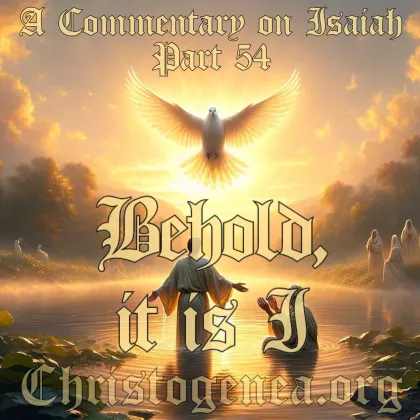





 Please click here for our mailing list sign-up page.
Please click here for our mailing list sign-up page.








Commentaries and Podcasts